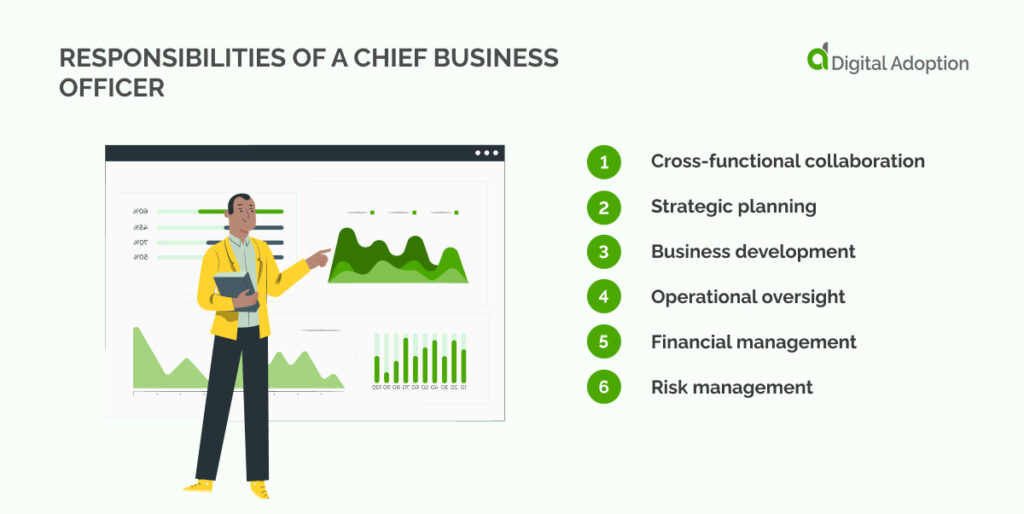Your chief business officer (CBO) is one of the most crucial people in the organization because they align the members of your C-suite toward a shared goal.
They coordinate strategies to sustain business growth by combining business understanding and knowledge with a strong leadership vision and liaising with other C-suites, such as the chief compliance officer and chief marketing officer, to build business strategies.
It may surprise you that 72% of organizations are working toward long-term strategic goals but still lack them. A chief business officer can accelerate goal achievement by staying updated on IT trends and investing in the best strategies for the company.
As more organizations attempt to navigate increasingly complicated global markets and their next digital transformation, they will need a CBO more than ever to integrate operations, finance, and strategic planning to achieve long-term goals.
This article will explore the crucial role of the CBO in driving enterprise success. We will define the position and outline the essential skills and responsibilities required to excel in this role.
What is a chief business officer (CBO)?
A Chief Business Officer (CBO) oversees a company’s business operations so that it can focus on strategic planning and growth. Their tasks include developing a business strategy, managing financial performance, allocating resources, and forging partnerships.
CBOs are crucial for aligning operations with company goals, driving profitability, and ensuring long-term success. They bridge gaps between departments, promoting collaboration and efficiency to help their enterprise succeed and grow.
Chief business officer skills

CBOs need several core skills to complete tasks and work toward a successful digital business strategy. These range from generic C-suite skills like leadership and communication to more specialized skills like constantly updating their knowledge of technologies competitors use now and in the future.
Leadership
Leadership is crucial for a chief business officer because the role involves guiding and inspiring teams toward achieving organizational goals.
CBOs implement leadership by setting clear objectives, providing direction, and promoting an environment of accountability and innovation. They lead by example to motivate employees and resolve conflicts.
Effective leadership ensures that all departments align with the company’s vision, driving collective success. This leadership is essential as it promotes a unified workforce, enhances productivity, and fosters a positive company culture.
Communication skills
Communication skills are vital for chief business officers as they facilitate clear and effective interaction across all levels of the organization. They use these skills by regularly communicating the company’s vision, strategy, and goals to employees, stakeholders, and partners.
They ensure that information flows smoothly, preventing misunderstandings and fostering transparency. Effective communication helps align efforts, promote teamwork, and build trust.
These benefits are crucial for business success as they ensure everyone is informed, engaged, and working towards the same objectives, enhancing overall efficiency and cohesion.
Strategic mindset
A chief business officer must have a strategic mindset to navigate complex business environments and drive long-term success. They demonstrate this by analyzing market trends, identifying growth opportunities, and developing comprehensive business strategies.
CBOs prioritize initiatives that align with the company’s goals and allocate resources effectively. This foresight enables the organization to adapt to changes, mitigate risks, and capitalize on new opportunities.
A strategic mindset is vital for business success as it ensures sustainable growth, competitive advantage, and resilience in a dynamic marketplace.
Financial acumen
Financial insight is critical for a CBO to manage financial health and drive profitability. They utilize this skill by overseeing budgets, financial planning, and performance analysis.
They make informed decisions based on financial data, ensuring optimal resource allocation and cost control. Monitoring financial indicators and implementing corrective actions maintain the company’s financial stability.
Financial insight is essential for business success. It ensures sound financial management, maximizes returns, and supports strategic investments, leading to sustained growth and profitability.
Understanding of technology
Understanding technology is vital for a CBO to leverage digital advancements and drive innovation. They implement this by identifying and adopting relevant technologies that enhance operational efficiency and competitiveness.
They oversee digital transformation initiatives, ensuring technology aligns with business objectives.
This knowledge enables them to make informed decisions about technology investments and integrations, such as implementing new technologies within AI compliance policies in collaboration with the chief compliance officer.
Understanding technology is essential for business success. It enhances productivity, streamlines processes, and opens new avenues for growth, keeping the organization at the forefront of industry advancements.
Relationship building
Relationship building is crucial for a chief business officer to foster strong partnerships and collaborations. They implement this by networking with key stakeholders, clients, and partners and maintaining positive relationships.
They communicate regularly, negotiate deals, and resolve conflicts amicably. Building solid relationships enhances trust and loyalty, leading to long-term partnerships.
These relationships are essential for business success as they ensure a reliable support network, facilitate business development, and unlock opportunities for strategic alliances and collaborations, driving growth and stability.
Ensure you consider all the above skills when you hire a new chief business officer to acquire the best talent for your needs and ensure long-term success.
Responsibilities of a chief business officer

Chief business officers have among the most crucial roles of all C-suites. As a result, they have various responsibilities to ensure cohesion among C-suites, leading to organizational success.
Cross-functional collaboration
The key to the CBO’s role is to promote and maintain strong, long-lasting cross-functional collaboration.
They are experts in establishing strong communication and strategic partnerships with all C-suites, such as the CEO, CMO, CTO, and CFO, to combine the skills of all these leaders and form a unified set of business strategies.
Strengthening C-suite collaboration promotes cohesion between organizational leaders and a more diverse knowledge base to inform decisions, leading to smoother organizational functions.
Strategic planning
Developing and implementing their organization’s business strategy is central to the CBO’s responsibilities. They use industry insights and knowledge acquired through years of experience to direct the organization toward adaptive strategy and innovative solutions.
When chief business officers align business objectives with long-term organizational goals, they help their company become resilient and agile in response to changing market dynamics.
Business development
The CBO is responsible for driving business growth. They use pioneering business development initiatives to help identify potential business opportunities, promote strategic partnerships, discover new markets, grow organizational influence, and diversify revenue sources.
A CBO’s ability to predict future trends is a significant part of business development. It allows them to conquer emerging markets, help their organization sustain growth, and compete in a challenging environment.
Operational oversight
Chief business officers can work with the COO (chief operations officer) or independently from them while they engage in operational oversight, for which they are primarily responsible.
Operational oversight ensures daily operations run smoothly by implementing optimized workflows and efficient processes.
The benefits of successful operational effectiveness are a high-productivity culture and agility, which enhances departmental efficiency.
Financial management
Chief business officers work closely with the chief financial officer (CFO) as they build strategic financial management approaches.
The chief business officers’ financial management responsibilities include:
- Financial planning: Ensures strategic alignment and long-term economic stability.
- Budgeting: Controls spending and supports efficient financial management.
- Resource allocation: Optimizes utilization of resources for maximum business impact.
When the chief business officer successfully aligns financial strategies with the organization’s growth objectives, optimal resource utilization is secured.
The benefit is organizational financial sustainability and a robust response to changes in a dynamic business environment, often requiring resources to move quickly from one department or technology to another to save time and act quickly to outperform competitors.
Risk management
CBOs protect their organization’s performance behind the scenes and, more publicly, its reputation. They achieve this by assessing and managing risks through risk mitigation strategies to safeguard their organization against threats.
Chief business officers must take a careful, detail-led approach to risk management to ensure their organization can deal with uncertainties and promote stability and long-term success.
Consider these responsibilities when hiring a new CBO or reviewing and optimizing the performance of your current chief business officer.
Chief Business Officer vs. Chief Operating Officer
It can be easy to confuse different C-suite roles. So, let’s compare the CBO and chief operations officer (CCO) to understand what each role does and the differences and similarities between the two.
What does a CBO do?
A CBO is a senior executive overseeing business operations, including sales, marketing, and HR, working with the CEO to develop strategies for efficiency and profit, focusing on financial objectives.
What does a COO do?
A COO, part of the executive team, oversees daily operations, ensuring efficiency. Reporting to the CEO, they help develop strategies and assist in product development to meet customer needs.
What are the differences between CBO and COO?
The COO oversees daily operations and internal processes, ensuring efficiency and operational success. In contrast, the CBO focuses on overall business strategy, including sales, marketing, and financial objectives, to drive growth.
While COOs handle internal execution, CBOs emphasize strategic direction and market positioning. Both roles report to the CEO, but their focus areas differ significantly.
What are the similarities between CBO and COO?
Both the COO and CBO are senior executives reporting to the CEO. They focus on enhancing the company’s performance, ensuring alignment with organizational goals, overseeing key departments, and contributing to strategic planning.
Both roles involve collaboration with other executives and play crucial parts in driving efficiency, profitability, and overall business success.
It’s helpful to compare these C-suite roles, especially as there is a lot of overlap with CBOs and other C-suites like COOs. These two roles oversee many activities across an organization, and comparing them will help leaders ensure that each can carry out responsibilities properly.
The best chief business officers are experts in collaboration
CBOs are responsible for many of their organization’s overarching strategies, such as overseeing the financial and digital transformation strategies. Their role includes facilitating C-suite strategy building and directly influencing others.
They must be expert communicators above all else to achieve their organization’s goals. They must gain information to build some strategies and ensure other C-suites have the necessary resources to plan and implement others.
When strategies are ready to be explained to employees, the chief business officer must ensure team members receive this information in a timely, simple, easy-to-implement way to help them work toward shared goals.
Every organization wants expert communicators who make the best CBOs. These can align strategies with organizational goals to streamline workflows, reduce risk, promote cross-departmental cohesion, and increase revenue for a financially secure future.













